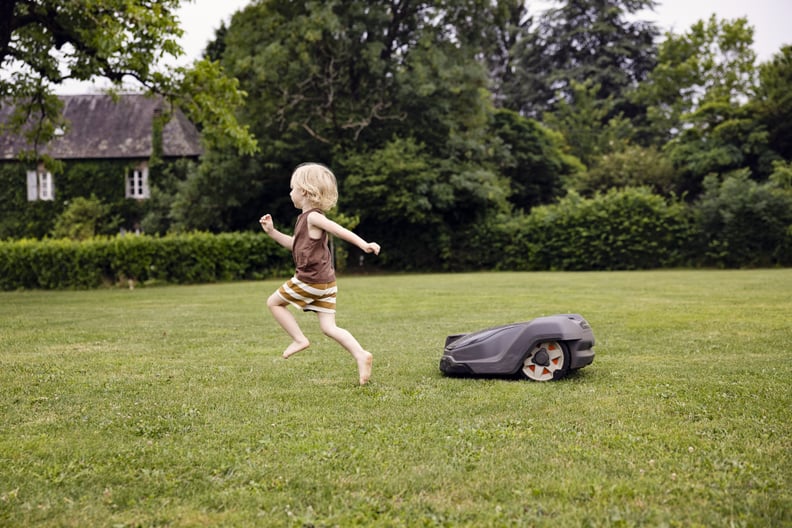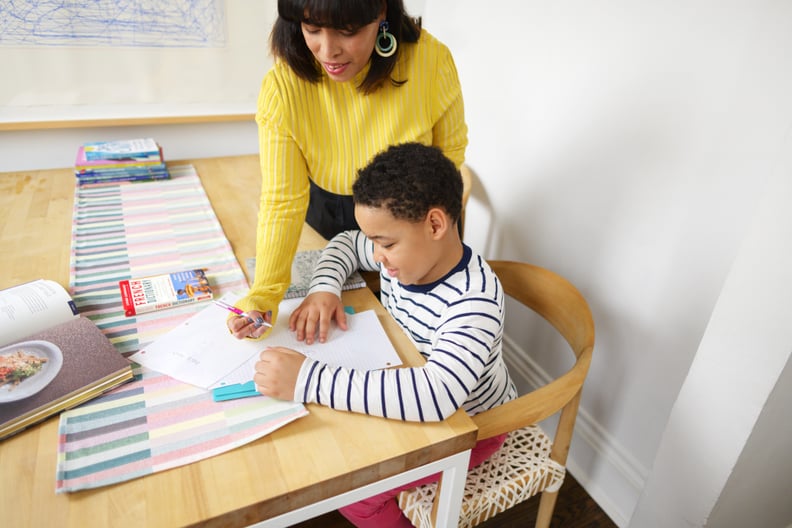9 Different Types of Parenting Styles — and How to Decide What's Right For You
If parenting is one of the most important jobs a person can have, then why isn't there a user manual? Well, in fact, there are thousands on the various parenting styles. For decades, clinical psychologists, researchers, pediatricians, and developmental experts have been authoring books purporting to offer the definitive guide to the types of parenting. But just like every family is unique and has its own needs, each child-raising philosophy has benefits and challenges that make it ideal for one parent and a nonstarter for another. That's why there are so many different parenting styles and aesthetics in the first place.
And although parents do not need to adopt a specific style verbatim, to figure out how you plan to raise your children, it's helpful to understand their nuances. We've accounted for the hundreds of different types of parenting styles and culled them down to the nine most popular. From authoritative parenting to gentle parenting to helicopter parenting, you're bound to find the right parenting style for your family. Whether you're looking to try something classic or opt for a buzzy alternative, read on so you can better understand the different parenting styles — and which one best suits your personality and goals.

Gentle Parenting
What it is: Among the parenting styles, gentle parenting has probably gotten the most attention recently. Gentle parenting is a peaceful and positive approach to parenting characterized by empathy, respect, and understanding. It promotes a relationship with your child based on willingness and choices rather than rules or demands made by a parent. In fact, proponents believe fewer rules that focus on what actually matters means children are more capable of sticking to them.
Why parents do it: Many parents who were raised with a punishment-based approach to discipline have sought an alternative approach with their own kids, and this method treats children more as equals. In place of instilling fear, parents offer understanding. They aim to better acknowledge why, for example, a child acted out or exhibited negative behavior. Then they work with their child to change it positively or, more difficult, accept what cannot be changed.
What research says: Research has shown that gentle parenting may reduce the risk of anxiety and also improve the parent-child bond.

Lawnmower Parenting
What it is: Lawnmower parenting went viral in 2018 after a teacher wrote an essay condemning parental meddling. Lawnmower parents go out of their way to remove any adversity or, worse, failure, that their child may face.
Why parents do it: This approach is certainly well intended as it stems from a desire to not see your child struggle. Often, parents with the finances and resources to solve problems — for example, with school admissions or placement on teams — feel it is their responsibility as parents to do so, whether their child has earned it or not.
What research says: A key risk in raising kids using this bulldozer-like philosophy is that when they eventually do encounter conflict, they won't be equipped with how to handle it. "Kids who receive the best of everything and don't have opportunities to practice defeat will later struggle when coping with life's messy nature," Jenny Grant Rankin, PhD, an educator, author, lecturer and writer for "Psychology Today" told NBC News in an interview.

Helicopter Parenting
What it is: Helicopter parenting is probably the type of parenting style you've heard referenced most often when referring to overbearing caregivers. Helicopter parenting is "a type of parent who's always hovering over their child's every move," per the Cleveland Clinic. This type of parent typically wants to be clued into every action and choice their little one makes, rarely letting them out of their sight to make their own decisions.
Why parents do it: It comes from a place of love and wanting to keep your child healthy and safe. But extreme hovering can actually do damage to your child's developments and ability to make their own decisions.
What research says: Research suggests the negative effects of helicopter parenting are similar to those of lawnmower parents, including higher levels of anxiety and depression. What's more, researchers also found that children of helicopter parents "may be less able to deal with the challenging demands of growing up," per the American Psychological Association (APA).

Tiger Parenting
What it is: This extreme parenting style was popularized by a Yale Law School professor's memoir, "Battle Hymn of the Tiger Mother", in which Amy Chua explains how many parents (think "stage moms," for instance) put intense pressure on their children to attain high levels of achievement and success – particularly in academics – above all else. This tough-love approach often means kids are discouraged from social activities like playdates that don't align with the competitive goals their parents have set.
Why parents do it: Anecdotally, parents who adopt this approach are also highly involved in their children's upbringing. They make the final call on extracurricular activities and course work. By running such a tight ship, they may very well see results, with children who attain the intellectual and career goals they've set out for them.
What research says: Several studies have disproven the merits of this disciplinarian approach. According to results published in the journal Developmental Psychologist in 2013, children with stereotypical "tiger parents" actually had a lower GPA than those with supportive parents, and harsh parenting leads to the worst developmental outcomes among kids.

Authoritative Parenting
What it is: Authoritative parenting is described as a more balanced approach to parenting in which parents "are nurturing, responsive, and supportive, yet set firm limits for their children," according to the APA.
Why parents do it: It's seen as the happy middle ground of parenting. As an authoritative parent, you're a parent first and friend second. Authoritative parents are usually firm but warm, per the APA. And although they hold high expectations, they are also quick to praise.
What research says: Over the years, authoritative parenting has been consistently associated with positive developmental outcomes, including psychosocial competence and academic achievement, according to the Journal of Child and Family Studies.

Lighthouse Parenting
What it is: Dr. Kenneth Ginsburg, a well-known physician with a focus on adolescent development, trademarked this term in his research-backed book "Raising Kids to Thrive" and called on parents to be metaphorical lighthouses for their children, visible from the shoreline as a stable light amid an ever-changing tide. In comparison to the other different parenting styles, for lighthouse parents, it's all about knowing when to let kids ride the waves and when to help them before they crash into the rocks.
Why parents do it: This style is similar to hands-off free-range parenting, yet many parents prefer it because it offers more of a healthy balance of independence with dependence and protection with trust. It's ideal for parents who want to be available for guidance but have no interest in steering the boat.
What research says: The positive effects of lighthouse parenting have been found across kids — particularly teens — who differ by race, gender, family income, and parents' education, according to the Center For Parent and Teen Communication at the Children's Hospital of Philadelphia. This means families from diverse backgrounds experience similar benefits. Ginsburg also tapped into the insights of 500 teens from across the nation for his book, and their varied perspectives often connect on the benefits of this approach.

Attachment Parenting
What it is: The phrase was popularized by well-known pediatrician Dr. William Sears in the 1980s when he published what many consider to be the attachment parenting bible, "The Baby Book." The idea behind this child-led approach is all about leaning into what the baby needs when they need it. From birth-bonding and babywearing, to co-sleeping and on-demand breastfeeding — attachment parenting prioritizes responsiveness and close physical contact with a goal of fostering a secure emotional connection.
Why parents do it: Proponents of attachment parenting believe this nurturing style is the ideal way to raise secure, empathetic children. Simply put, many new parents themselves enjoy the bond they achieve with their newborn by following the key components of the practice.
What research says: Breastfeeding is one of the tenants of this method and it has been associated with medical, nutritional, and developmental benefits for baby, according to research. What's more, a 2019 study showed that attachment parenting style may also improve a child's language skills. On the flip side of things, some experts worry that some parents tend to overdo it in trying to meet their child's every request. This can be "exhausting and counterproductive," according to The Greater Good Science Center at the University of California, Berkeley.

Slow Parenting
What it is: In an era where overscheduling and overdoing it is the norm, the concept of slow parenting provides a sense of relief. This parenting method tends to focus on quality over quantity, real and meaningful human connections, and being present and in the moment, per the New York Times. "Children need to strive and struggle and stretch themselves, but that does not mean childhood should be a race. Slow parents give their children plenty of time and space to explore the world on their own terms. They keep the family schedule under control so that everyone has enough downtime to rest, reflect and just hang out together," the Times reports.
Why parents do it: By opting out of a high-stakes lifestyle that prioritizes quantity over quality time, parents can curate a different kind of upbringing that emphasizes balance and self-discovery. "It isn't as much about doing nothing as it is about doing things consciously and at the right pace for the family," Susan Sachs Lipman, author of "Fed up with Frenzy: Slow Parenting in a Fast-Moving World" told the Washington Post.
What research says: There isn't much research about slow parenting specifically, but the Boston Globe reports that "doing too much can be draining on adults" and "debilitating for kids whose brains are still developing." A 2014 study showed that over-scheduling kids can be detrimental to their health. "The more time kids had in less structured activities, the more self-directed they were and, also, the reverse was true: The more time they spent in structured activities, the less able they were to use executive function," study author Yuko Munakata told CBS News.

Free-Range Parenting
What it is: In stark contrast to the more overbearing styles out there, free-range parenting takes a hands-off approach in order to raise self-reliant children. By trusting kids' autonomy, these parents allow their kids to have more age-appropriate freedoms. It involves trial-and-error and risk-taking, but the goal is that their well-deserved independence will set them up for success as they grow up.
Why parents do it: Many fans of free-range parenting want their kids to have a strong sense of independence and do so by operating with little oversight. This includes letting kids do things and make decisions without your supervision, like walking to school or taking public transportation.
What research says: The main concerns surrounding free-range parenting are legal ones. In many states, there are laws and restrictions surrounding what minors are allowed to do unsupervised. Still, some research has shown that encouraging a child's independent mobility has been linked to improved mental and physical health.
